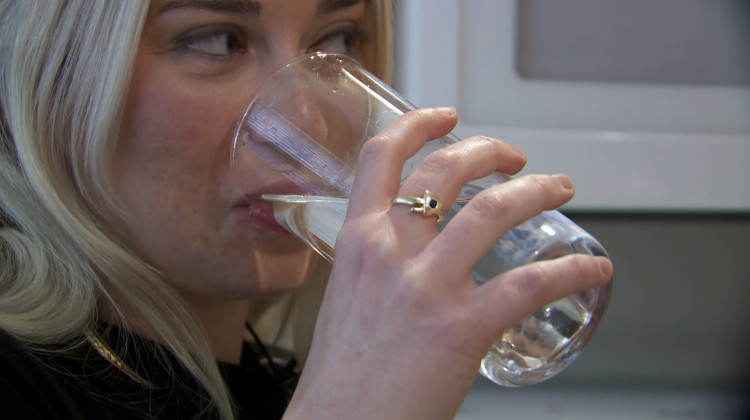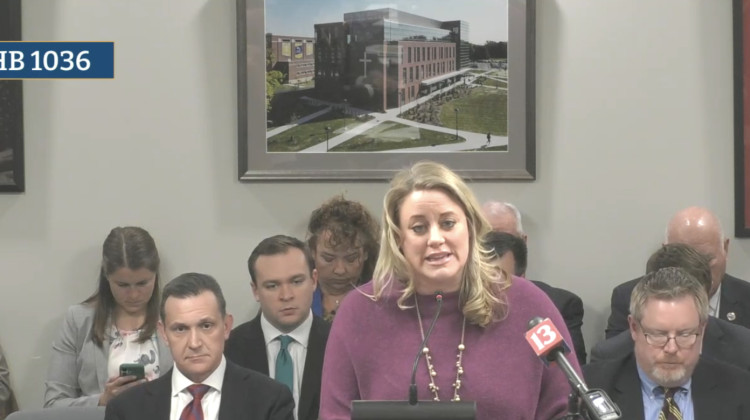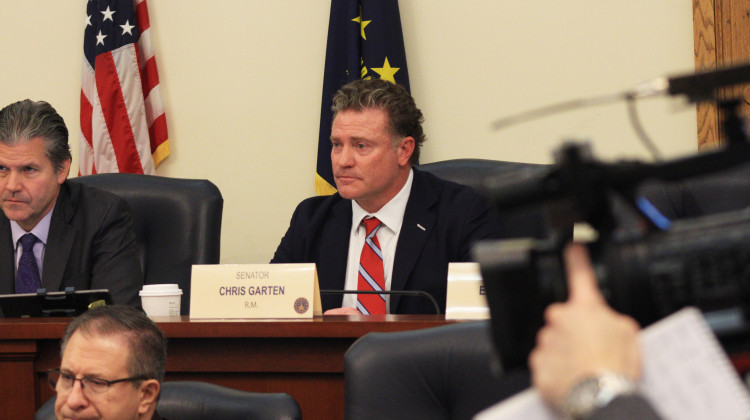
IU Public Health student Samantha Bettinger takes a sip of her tap water in the late summer when algae issues on Lake Monroe were causing taste and odor issues with the city of Bloomington's water.
Devan Ridgeway/WTIUListen to a radio version of this story
As we get more warm weather and heavy rain events in Indiana, we could see more toxic algae blooms — making fish sick, closing public beaches, and polluting drinking water.
While most of the state gets its drinking water from the ground, many of Indiana’s larger cities get their water from things like lakes, rivers and reservoirs. If things don’t change, Hoosiers will likely be paying more to keep their water safe.
Samantha Bettinger is a doctoral student at Indiana University’s School of Public Health. Late this summer, she noticed the water tasted —well, kind of like dirt. At first, she thought it was just the water at her apartment complex.
“And come to find out it was pretty much everywhere in the city of Bloomington that I had went to and had the water that I noticed that it was really starting to taste funny and kind of smell funny," she said.
The city of Bloomington said the water was safe to drink, just unpleasant. But Bettinger didn’t want to take any chances. She’s originally from Toledo, Ohio — which made headlines in 2014 when a toxic algae bloom in Lake Erie polluted the drinking water. Thousands of residents were went without clean water for about three days.
“I've actually had this experience before where we went under a water boil advisory because the levels were so high and that specific algae can cause liver damage," Bettinger said. “So we were pretty conscious about not drinking and especially during that boil advisory.”
With that experience in mind, Bettinger started buying water jugs to drink from at home.
“I keep bottled water in my car. Just so if I’m out in public, if I go to a restaurant, or I'm out with people I have access to better tasting water," she said.
Bettinger wasn’t alone. When we visited Michael Welber, he had a kitchen counter full of plastic water jugs.
“You can see how many of them I’ve already purchased and I don’t know what I’m going to do with them," he said.
Welber said even his in-home filter couldn't filter out the bad taste.
Vic Kelson is the utilities director for the city of Bloomington. He said the odd summer weather created the right conditions for more blue-green algae on the lake.
“September was very, very warm, very, very sunny, and very, very dry," he said.
Algae Treatment Adds To The Cost Of Rising Water Bills
Blue-green algae can produce chemicals in drinking water that do everything from make people sick to just affecting the smell and taste — like in Bloomington. Dealing with them can be expensive.
Kelson said the city used to have issues with taste and odor every summer. In 2016, the utility started adding activated carbon to help combat it, to the tune of about $100,000 a year. The city added even more this summer. Kelson said the utility also bought a device that helps detect algae in the raw, untreated water.
“If we start to have more of these kinds of incidents, we may have to invest in additional hardware, additional chemicals, additional training. We have to be more vigilant. All of those things cost money," Kelson said.
Kelson said, fortunately, the city has lots of customers to help spread out that cost. So that big price tag for activated carbon becomes just pennies more for Bloomington residents.

But algae treatment isn’t all customers are paying for. Water utilities around the country have crumbling infrastructure that needs to be replaced — like lead pipes. According to Bluefield Research, water rates in the U.S. have gone up more than 40 percent in the past decade — rising faster than any other household utility bill.
Edward Moore is the director of public utilities for Toledo. He said since 2014, the city has pumped about $500 million into its water infrastructure to prevent another catastrophe and a lot of that cost gets passed on to ratepayers.
“We can go to the state and get grants for road projects to the tune of 80, 90 percent. They'll pay for it — and I know there's a highway tax and all that stuff associated with it. But if I do a water sewer project, the cost of that entire project is passed on to the ratepayer, there is no government subsidy for that," Moore said.
Moore hopes the infrastructure bill recently signed by President Joe Biden will help take some of the pressure off of lower-income Toledo residents.
Anne Schechinger is the Midwest director for the Environmental Working Group — which tries to track algae blooms.
“When we see increases in utility rates, it definitely affects people who are lower-income the most. And in other situations as well, it can definitely affect communities of color," she said.
Few Federal Rules Protect People From Toxic Algae
In some ways, residents of Bloomington and Toledo might consider themselves luckier than others. Schechinger said the Environmental Protection Agency doesn’t actually require utilities to remove toxic algae from drinking water.
“Anytime a utility removes algae that's toxic from their drinking water, it's because they care about residents that they're serving water to. So the EPA is not doing enough here," she said.
The EPA did require some utilities to test for algae, but that requirement expired last year. Because of this, Schechinger said people could be getting sick from contaminated drinking water and not even know it.
Short term it may just feel like a stomach bug. But some chemicals from the algae can cause liver damage and studies have linked some to brain disorders.
“So over time exposure can be really scary for your health," Schechinger said.
The EPA’s internal watchdog group, the Office of Inspector General, said the agency needs to come up with a plan for how to handle harmful algae blooms. But even if the EPA does, stopping nutrient pollution is going to be a challenge.
Homeowners, Landowners Will Have To Come Together To Solve The Problem
Maggie Sullivan is the Lake Monroe watershed coordinator and part of the non-profit Friends of Lake Monroe. She said most people don’t realize that what happens on their property could end up in someone’s drinking water.
“The watershed is 440 square miles. So there's people that are in northwestern Jackson County and what they do on their property impacts Lake Monroe, and they may not even have Lake Monroe on their radar at all," Sullivan said.
But there are things individuals can do right now to prevent more algae blooms in the surface drinking water sources that Indiana cities rely on. That includes taking care of your septic system, planting cover crops on farm fields as well as trees and shrubs along streams, and using fertilizer only when necessary.
Jane Martin chairs the board of the Lake Monroe Water Fund — which raises money to fund water quality projects upstream. She said water from Lake Monroe is the underpinning of not only Bloomington, but Indiana University and the local economy. The lake is habitat for wildlife and one of the top places for outdoor recreation in the area.
“Lake Monroe was built in 1964 when IU ran out of water and threatened to move out. So Lake Monroe is all we have, we can't use Lake Lemon anymore, or Griffy, or what used to be called University Lake," Martin said.
If the lakes, rivers, and reservoirs become too polluted to draw water from, it’s not clear what other options Indiana’s larger cities might have. Martin said that’s why people in the Lake Monroe watershed — and around the state — have to address issues like algae now and not wait until there’s a water emergency.
Contact reporter Rebecca at rthiele@iu.edu or follow her on Twitter at @beckythiele.
Indiana Environmental reporting is supported by the Environmental Resilience Institute, an Indiana University Grand Challenge project developing Indiana-specific projections and informed responses to problems of environmental change.
9(MDAyMzk1MzA4MDE2MjY3OTY1MjM5ZDJjYQ000))
 DONATE
DONATE






 Support WFYI. We can't do it without you.
Support WFYI. We can't do it without you.